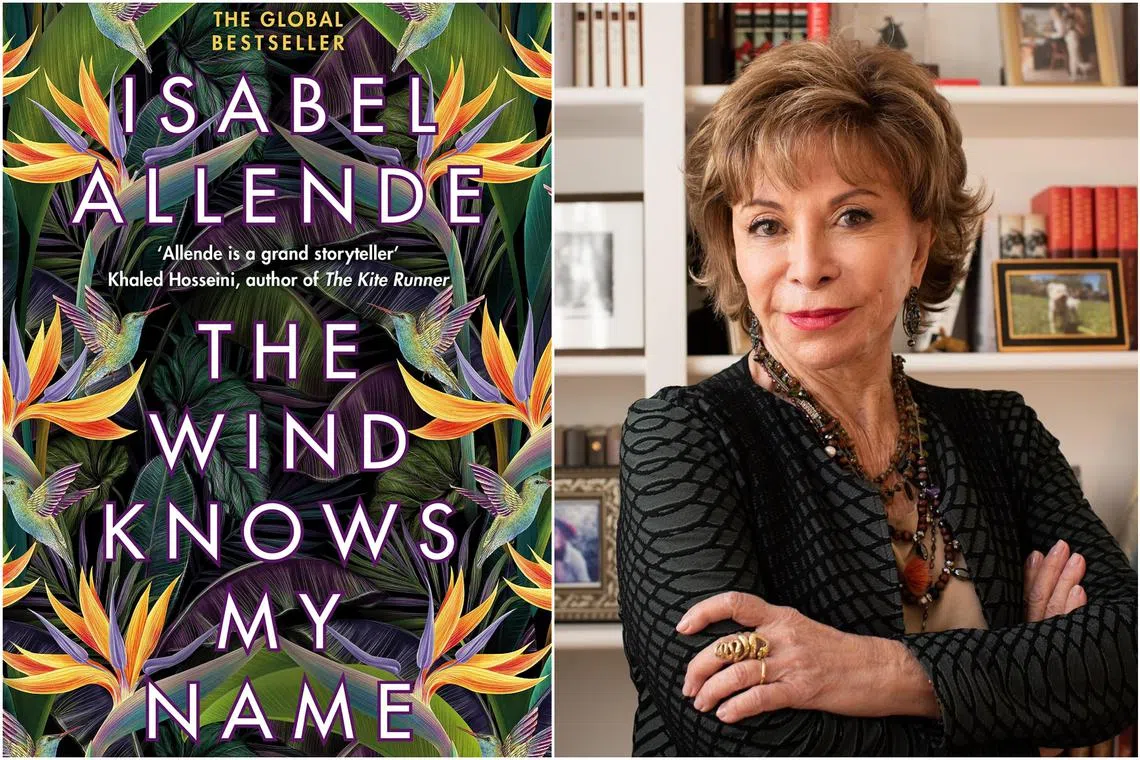I have been displaced all my life: Chilean-American author Isabel Allende on identifying with refugees
Sign up now: Get ST's newsletters delivered to your inbox

Isabel Allende's novel tackles the trauma of children displaced from their homes and forcibly separated from parents.
PHOTOS: COURTESY OF BLOOMSBURY, BLOOMSBURY UK
Follow topic:
SINGAPORE – Isabel Allende, 80, reflected on her childhood experiences of displacement for her latest novel, The Wind Knows My Name.
Over a Zoom call from her home office in California, she says: “I was born in Peru and when I was three years old, my father abandoned my mother. We moved back to my grandfather’s house in Chile and I lived there until my mother married a diplomat.”
Those early years in Chile provided structure and stability that Allende would crave during her later peripatetic life.
The articulate author says: “We travelled. All of my childhood and adolescence was about saying goodbye to places, people, friends, schools, languages, whatever.”
Displacement pervaded her early adulthood as well. “I became a political refugee in Venezuela in 1973 and an immigrant in the United States in 1988. I fell in love with an American and never went back to live in my country.”
She married her second husband, California attorney and novelist William C. Gordon, in 1988. They divorced in 2015.
Her first husband was Mr Miguel Frias, with whom she had two children, Paula and Nicolas. They divorced in 1987.
She married Mr Roger Cukras, a lawyer from New York, in 2019.
Often praised for the intimacy and insight she brings to historical fiction, the Chilean-American author pays careful attention to the contemporary stories of children forcefully separated from their parents in her latest work.
Allende says: “It was the official policy of the government under (former president Donald) Trump to separate the families to deter people from coming to the US. That was implemented in 2018.
“There was an international uproar because people saw children in cages and babies taken away from breastfeeding mothers. Of course, there was also an uproar in the US, so the policy was cancelled, but it secretly continued during the night.”
Following two children in dual timelines, The Wind Knows My Name opens in 1938 with a five-year-old Jewish boy named Samuel Adler being sent to England as a refugee. Much like the 10,000 real children from history rescued under the Kindertransport programme, he never sees his family again.
In 2019, the story follows seven-year-old Anita Diaz, who finds herself alone at an immigrant camp in the US after fleeing El Salvador with her mother.
For Anita’s story, Allende pulled from first-hand accounts.
“I have a foundation, the Isabel Allende Foundation, which works to help women and girls. We have several programmes and organisations that work with refugees at the border, so I get to hear many stories.”
Allende handles the heavy subject matter with care as she weaves in stories she hears from real people and her own childhood experiences of longing for her grandfather’s home in Chile.
She notes that though her stories are often sad, she chooses to focus on the unacknowledged helpers.
Allende says thoughtfully: “For every victim, there are people trying to help. My attention is always on them, why they do it and how they do it. In general, those people are women.”
According to her, about 40,000 lawyers and paralegals are now working in the US to represent children who have been forcefully separated from their parents.
The graceful author, who sports a stylishly short bob, explains: “Most of those with legal representation before a judge end up getting asylum. The ones without immediately get deported.”
In the acknowledgements, Allende mentions Annie Torez, an El Salvadoran woman who fled to save her life, leaving behind three children until she could bring them to the US six years later.
“They were almost adults by then and they did not forgive her for leaving them behind, even though it was to save their lives, and she was sending money back to support them,” Allende says sadly.
“Intellectually, I think some children grow to understand their parents’ decisions. Emotionally? I don’t know.
“Annie’s children know the history of El Salvador – the repression, dictatorship and killings – but from an emotional point of view, every time something happens, it brings up feelings like ‘You abandoned me, you didn’t love me enough, you didn’t bring me with you or stay with us’.”
Allende’s own experience has taught her that one can never predict how a child will grow up after experiencing such trauma.
“I have seen trauma leave a hole in the heart of the individuals. Yes, they bounce back, they have a life and many of them succeed, but the trauma they carry is unforgettable. It determines their personalities and often their lives.
“For every child that bounces back, another does not.”
The Wind Knows My Name ($26.33) by Isabel Allende is available on Amazon ( amzn.to/44vFvzV
This article contains affiliate links. If you buy through these links, we may earn a small commission.


